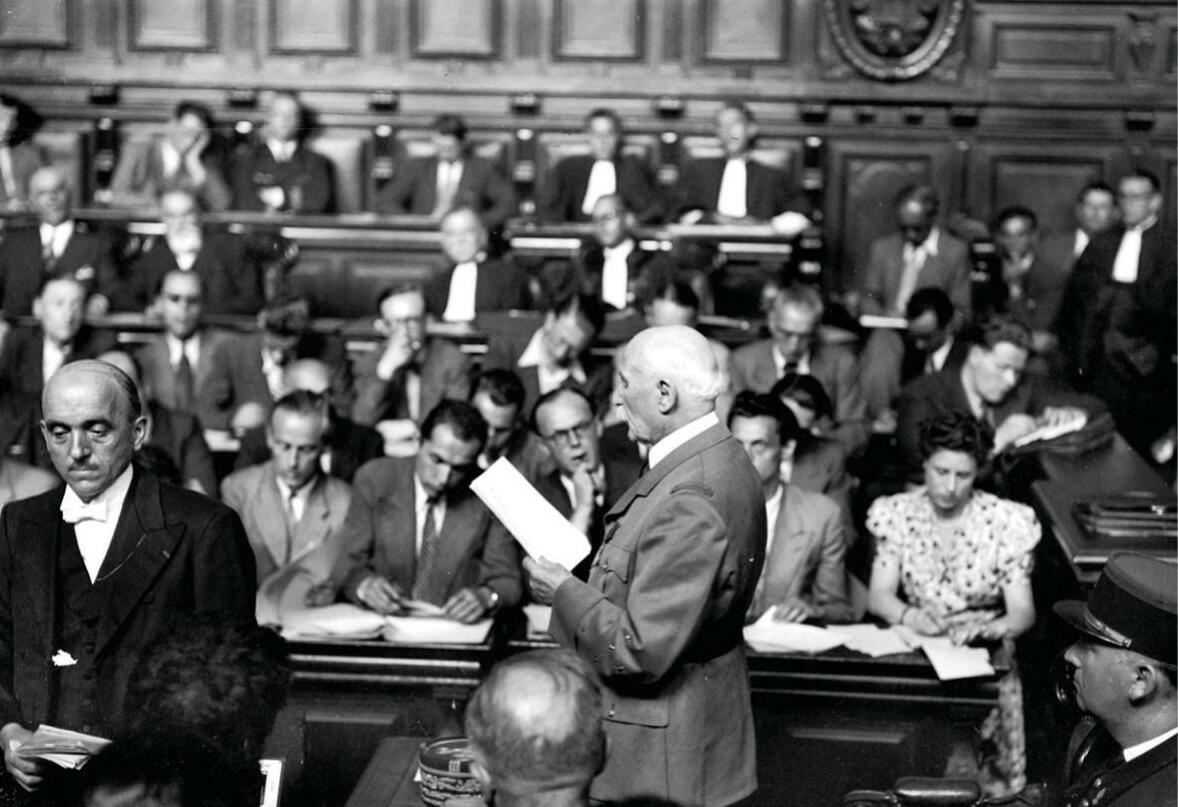
A few years ago, I was phoned by a journalist seeking a comment on a recent survey of schoolchildren that had revealed their shocking ignorance about the history of the Second World War. A few of them, he informed me, thought that VE day had something to do with sexually transmitted diseases. A lot of them identified Churchill as a bulldog advertising insurance products on television. And some of them, he said by now waxing indignant even thought that France had fought the war on the side of the Germans.
I wasn't quite sure how to break the news to him. I told him, as gently as I could, that the school pupils were right - at least as far as the French were concerned. For most of the war, led by the internationally recognised collaborationist government based at the spa town of Vichy, France was indeed allied to Nazi Germany. That regime was led by a great military hero of the First World War, Marshal Philippe Pétain. Born in 1856, he was nationally venerated for his stubborn defiance of German aggression at the nine-month-long battle of Verdun.
France on Trial: The Case of Marshal Pétain
by Julian Jackson Allen Lane, 480 pages, £25
In 1940, as France's defeat by the invading Germans became inevitable, Pétain was appointed head of the government, and negotiated an armistice that was signed on 22 June 1940. It left the north and west of the country under German occupation but allowed the rest of France, with its overseas colonies, to carry on under Pétain's leadership.
Backed by a somewhat dubious vote of the legislature that gave him near-dictatorial powers, the marshal passed a raft of new laws on his own initiative, establishing censorship, discriminating against Jews, and replacing the republican slogan 'Liberty, Equality, Fraternity' with 'Work, Family, Fatherland'.
Esta historia es de la edición September 2023 de BBC History UK.
Comience su prueba gratuita de Magzter GOLD de 7 días para acceder a miles de historias premium seleccionadas y a más de 9,000 revistas y periódicos.
Ya eres suscriptor ? Conectar
Esta historia es de la edición September 2023 de BBC History UK.
Comience su prueba gratuita de Magzter GOLD de 7 días para acceder a miles de historias premium seleccionadas y a más de 9,000 revistas y periódicos.
Ya eres suscriptor? Conectar
A modern icon
IVWWAN MORGAN lauds an insightful and clear-eyed examination of a leader blessed with charisma and quality but also marred by personal flaws

Shipwrecks on Scilly
Beneath the clear waters of the Isles of Scilly lurk treacherous rocks on which more than 1,000 ships have foundered. CLARE HARGREAVES discovers their stories

Medieval sambocade
ELEANOR BARNETT recreates an early cheesecake - a dish with surprisingly long roots stretching back well over two millennia

Greek drama
LLOYD LLEWELLYN-JONES is swept along by an engaging exploration of the Ptolemaic rulers of Egypt in the final centuries before Rome conquered this ancient land

Unravelling the enigma
JOSEPH ELLIS is impressed by a detailed, colourful and insightful biography of George Villiers, a Stuart royal favourite who made powerful enemies

The Elusive Pimpernel
Some suffragettes marched with banners, or printed and distributed propaganda pamphlets. Others took more direct action. DIANE ATKINSON tells the story of one activist who employed arson to spark awareness of the burning issue of women’s suffrage

A HILL TO DIE ON
In early 1944, the Allied advance in Italy was brought to a halt at a rocky outcrop called Monte Cassino. And at the heart of the bloodbath that followed, writes James Holland, was flawed leadership

How to build a radical
How to build a radical 6 8 The experiences that shaped Guy Fawkes and his gunpowder plot co-conspirators into violent extremists seem all too familiar today. Lucy Worsley tells a story of religious clashes, state-sanctioned torture and comrades-in-arms willing to die for the cause

WHO WAS GREATEST THE US PRESIDENT?
With Donald Trump set to be inaugurated as the 47th president, we asked seven historians to nominate their choice for the most accomplished American leader

Land of make believe?
Marco Polo's adventures in Asia earned him everlasting fame. But are his accounts of his travels essentially works of fiction? Peter Jackson asks if we can trust this medieval travel-writing superstar